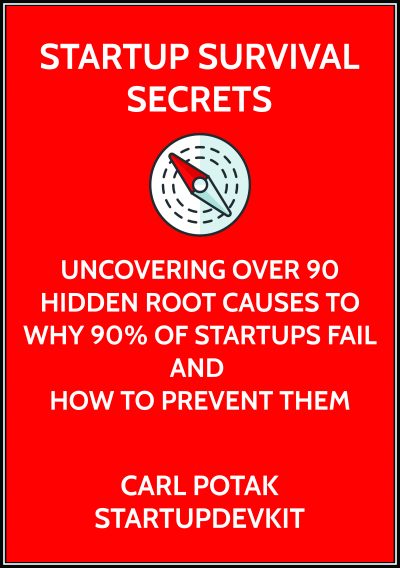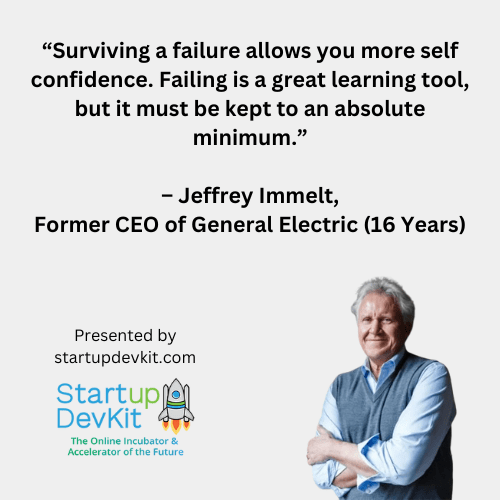You’re here because you must be wondering why startups fail? If I were to give you one reason, or even ten reasons, that would still not be enough to tell you why. 90% of startups fail and it’s attributed to over 100 root causes. However, we can still shed light on a lot of them in this post so you can get a better idea what you’re up against.
Introduction
Have you ever dove into something head first and made a lot of mistakes because you didn’t completely know what you were doing, but eventually learned and picked it up? Most people have done this before, including myself. It probably took a lot of time and caused a lot of unnecessary stress in the process, didn’t it?
Or are you the type of person that likes to read up or watch videos on a topic before you start the project and write down what you need to do? This is usually a better approach. If that’s how you work, that’s great. Having a process to follow as you start a startup is hugely important.
Whichever approach you take, though, mistakes will be inevitable with your startup.
We want to help you minimize your mistakes and save you time, money, and unnecessary stress. Stress can wreak havoc on our bodies and minds, and if left unchecked, it can escalate into significant problems. Needless to say, it can make your startup journey even more challenging.
Furthermore, we are especially keen on assisting you in avoiding major mistakes that could lead your startup to failure. The larger the mistake, the higher the stress. Founders’ mental health is of the utmost importance and poor mental health is somewhat of an epidemic in the industry.
This requires a different approach than trial by fire and even different approach to traditional learning that will enhance your understanding of how startups should be planned for, built, run, and how they should grow. To illustrate some key differences in learning that will help you see this different approach, we’ll briefly touch upon learning models so your mind can get tuned for a game-changing approach.
Failure-Based Learning vs Iterative Learning
Failure-Based Learning
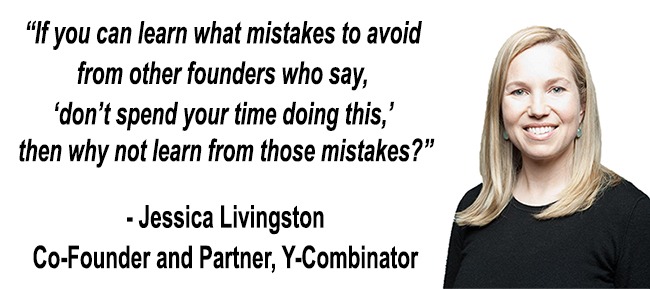
In grade school, we are taught history, our mistakes, and about the horrific wars of the past. We are taught about them so we don’t repeat the mistakes of the past.
Similarly, we are helping you to learn from the failures of our predecessors and even from our own experiences. Learning this way helps you avoid repeating the same mistakes and learn what to do instead.
Learn how to avoid the epic mistakes that cause startups to fail and can save yourself from:
- Boatloads of stress
- Delays from mistakes
- Money spent on mistakes
- Legal mistakes
- Hackers that can ruin you
- Relationships getting ruined
- Lost capital from your opportunity cost
- And more
Even though we have more information available now than ever before which can help startups, a lot of people are either consciously ignoring the right information, working off of bad information, or don’t know where to find it. Within 5-10 years of starting a startup, 90% of startups fail overall and 70% of venture-backed startups fail. Usually 20% or more die within the first year, according to the Kauffman Indicators of Entrepreneurship Startup Early Survival Rate.
That’s in part because we don’t have a large-enough culture in our industry that encourages us to learn from the mistakes and failures of those before us.
Iterative Learning
Instead, our learning in the startup world has been more about iteration and learning from what we do right now with our products or services. That’s not a bad thing at all. In fact, it’s a great thing. It helps us move towards product-market fit. But it’s only part of the formula for startup success. This iterative process came from the lean startup movement, which was started by Eric Ries, an academic. He cared about improving the startup development process and wrote a book on it called The Lean Startup.
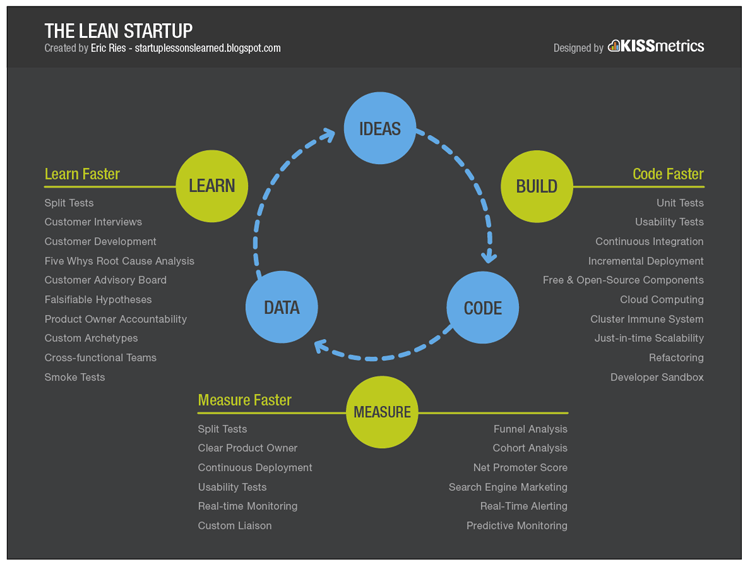
It was a game-changer for the industry and it’s certainly helped the community to have a better framework for development and it contributed to more successes, but it did not solve the problem of widespread startup failure, either. The crux of his writings on the lean startup model can be summarized by the former infographic, but his book is still a really solid read that we do recommend. Applying Ries’ scientific approach makes sense. Doesn’t it?
Even if an experiment fails, we can get information from it and then restart the experiment in a different iteration. You use a different variable or different conditions, test it, and continue to improve upon it.
Moving Forward
Eric Ries’ work has greatly helped the startup community progress forward, but the global startup community still needs more innovation to increase successes and reduce failures. And some people and organizations are actively working on that failure-based innovation, including us. AI is helping us get there by providing easier access to crowdsourced information more than ever, but that alone won’t do the trick.
 Given that 90% of startups still fail despite using the Lean Startup model, it’s evident that we must adopt a fresh perspective and approach. We require a more qualitative and analytical approach that delves into the reasons for startup failures.
Given that 90% of startups still fail despite using the Lean Startup model, it’s evident that we must adopt a fresh perspective and approach. We require a more qualitative and analytical approach that delves into the reasons for startup failures.
Most new founders aren’t aware of the causes that can lead to a startup’s possible failure. Heck, a lot of repeat founders aren’t either. We’re trying to change that in a big way. Albert Einstein once said, “the definition of insanity is doing the same thing over and over again and expecting a different result.” It would be insane to do the same things as nearly everyone that fail else by not learning from other failed startups mistakes and others mistakes in general.
So let’s not be insane. Let’s listen to Einstein. The first lesson is to avoid this insanity is to look at the top 20 reasons why startups fail. The second lesson is to learn about them.
Why Startups Fail – The Top 20 Reasons Why Startups Fail from CB Insights
CB Insights’ post-mortem study has been the best study so far, as it sheds an incredible amount of light on to the reasons why venture-backed startups have failed. CB Insights has helped us learn some of the lessons that previously failed VC-backed founders have learned. Their post-mortem study shares those stories and the top 20 reasons why startups fail according to those founders. It acknowledges the broad problems and includes context from the startups who have been taking part in the survey, but it fails to focus on the root causes of these issues. 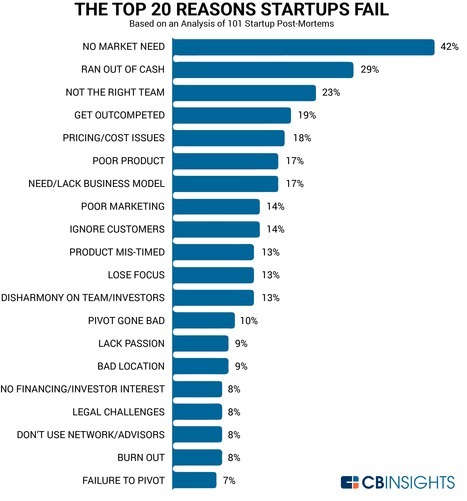
The top reason why startups fail is shown to be no market need and its causes are numerous. But stopping there in analyzing why startups fail would be delinquent.
There have been a few studies that mention general problems that lead to startup failure like premature scaling by the Startup Genome Report and startup survival from the Kauffman Index of Startup Activity, but they have less specific insights.
And if you think about it — if 7/10 VC-backed startups are failing, it is that much harder for bootstrapped startups. VC-backed startups are ahead in the game from all of the resources and connections they have at their disposal from the VC firms that fund them.
Venture capitalists bet that 1 of ten of their investments will pay off in the long-term and that 9/10 will result in meager returns, modest returns, or no return. They actively try to help their portfolio of startups to succeed, but it often just doesn’t work out for many of them.
Not trying to be a Debbie-downer or discourage you here…just telling it how it is. But it doesn’t mean we can’t change this narrative.
Some companies on the brink of failure have remarkable pivots. Slack did this and went from a failing startup to become a unicorn. So just because a company may be close to failure it doesn’t mean that they will.
Let’s dive into many of the root causes of startup failure.
Diving into the Root Causes to Why Startups Fail from Startup Survival Secrets via the First Five Reasons from the CB Insights Chart
The root causes below are from my book about startup failure and how to limit the mistakes that cause it. The book dives into the root causes to why startups fail based on each reason provided by CB Insights and I write about what to do instead, as well.
If you subscribe to our newsletter, you will get the first five chapters of it for free in the welcome email. If you become a customer by purchasing a membership or get mentored and coached, you’ll get the first ten chapters of it as an added bonus. Some of the root causes below will be added into the final version of the book when it’s fully released. We also share more resources about startup failure in our resource library on our platform.
As you can see below, there are myriad root causes to why startups fail.
1. No market need – 42%
- Idea not properly validated or idea validation never happened
- Arrogance that no validation is necessary
- Founders aren’t experts in their industry enough to gauge market need
- Fear of unknown leading to never going out and selling their product
- Lacking product-market fit, having never found enough of their target customers to sell to
2. Ran out of cash – 29%
- Burn rate too fast and expenses too high
- Scaled staff too quickly
- Supply of physical product/service inadequate to reach sustainable traction
- Didn’t fundraise enough or at all
- No plan for making money
- Mismanaged finances. Learn how to better manage your startup finances
- Didn’t get enough customers to be sustainable
- Had a bad business model for revenue generation
- Too few revenue streams
3. Not the right team – 23%
- Team’s skills too imbalanced – didn’t find the right co-founders
- Not the right skills to run the company (both soft and hard skills)
- Disharmony on the team. Find harmony with a company culture everyone buys into, as well as through improving communication skills and practicing top principles.
- Financial instability of founders
- Incompetence
- Clashes between co-founders and investors
4. Get outcompeted – 19%
- Unaware of the market
- Not keeping track of competition
- Market too crowded with competition
- Getting completely outcompeted
5. Pricing/cost issues – 18%
- Product or service too expensive to make
- Overhead is too high
- Product is priced too high
- Product is priced too low
- Licensing costs too expensive
- Expenses drove up prices resulting in not enough customers
Methods of Mindfulness to Stop Failure in its Tracks
When approaching a situation, you can ask yourself several questions to assess whether you’re on the right path:
- Am I following tried and tested practices for this?
- Am I acting on impulse or a well thought-out process?
- What do my advisors think and why?
- Is building this feature to address an area of weakness for us or build on a strength, and is it worth pursuing?
- Have I made an educated decision based on my users’ behaviors?
- How does my team feel about the potential choices in front of us?
- Can I implement a process to mitigate this cause for failure or are there actions can I take to make it better so it’s less likely to happen to me?
- How else can I prevent this reason for startup failure from happening to my company?
People in the Startup Industry Who Are Continuing to Crack the Code of Why Startups Fail
Please note that the links for these books are affiliate links, so if you click on them and purchase them, we may get a commission from your purchase.
Noam Wasserman
To further crack the code of startup failure, let’s take a look at some really helpful books. There’s a good book out there called The Founder’s Dilemmas – Anticipating and Avoiding the Pitfalls That Can Sink a Startup, by Noam Wasserman. The book goes into detail about interpersonal relations within the team and how it can affect a startup’s success or failure. It’s very well-written and it has a lot of great insights to share. However, it only discusses team-related reasons why startups fail.
Ben Horowitz
An incredible book we suggest is The Hard Thing About Hard Things – Building a Business When There Are No Easy Answers, by Ben Horowitz. Ben Horowitz is a Partner in Andreessen Horowitz, a venture capital firm based in Silicon Valley. He talks about the lessons he’s learned from his startups during his roller coaster of a career. His companies were facing failure several times and he shares how he prevailed. Horowitz shares the pros, cons, and potential outcomes of the decisions he was making as a founder. He also shows how sometimes there are scenarios that you can’t have your cake and eat it too. Sometimes, you have to go with the choice with the fewest cons and the most pros.
Tom Eisenmann
And, like the title mentions, he talks about why his decisions were so hard to make and the fallout that came after them. Another book that recently came out is called Why Startups Fail – A Roadmap to Entrepreneurial Success by Tom Eisenmann, a Professor at Harvard Business School and it provides lots of valuable insights.
Carl Potak
The human element indeed creates a lot of diversity in the root causes to the reasons of startup failure. It creates so much situational diversity that I wrote a book called Startup Survival Secrets, which dives into the top 20 reasons for startup failure from CB Insights, the root causes to those reasons, how to prevent them, and what to do instead.
I wanted to write something different because we need a different approach to reduce startup failures increase successes so people can live happier lives and make the impact on society that they want to make. Moreover, I’m sharing not only second and third-hand mistakes but also mistakes that I’ve personally made and encountered. Startup Survival Secrets is currently in its editing stage so it will be available as soon as possible.
Conclusion
Startups are a huge responsibility and shouldn’t be taken lightly. Failing with individual projects or hypotheses happen. But failing to keep a company alive and well after you’ve validated your startup idea, hired people, and have existing customers to delight — is not good. That’s why you’re going to have to work hard to have the best possible startup and remain successful for as long as humanly possible.
Since startups are made of people, mistakes can and will happen because we’re human. It’s impossible to never make mistakes with a startup. So nobody can expect that they or their employees will be perfect in avoiding all of them. But the fewer mistakes, the better – and after learning about startup failure and many of the reasons why it happens, you’ll have a greater chance of creating a successful startup.
However, be mindful of the pursuit of perfection, because nothing is ever perfect. Don’t take small mistakes personally. Just be understanding, look at them as learning experiences, and try to prevent them from occurring again.
Both in business and personally, we recommend to always maintain a mentality that there is room for improvement and one should set aside all ego in pursuit of such improvement. Process-oriented checklists can help with preventing mistakes from general human error, but not from blunders in decision-making and poor human interactions.


